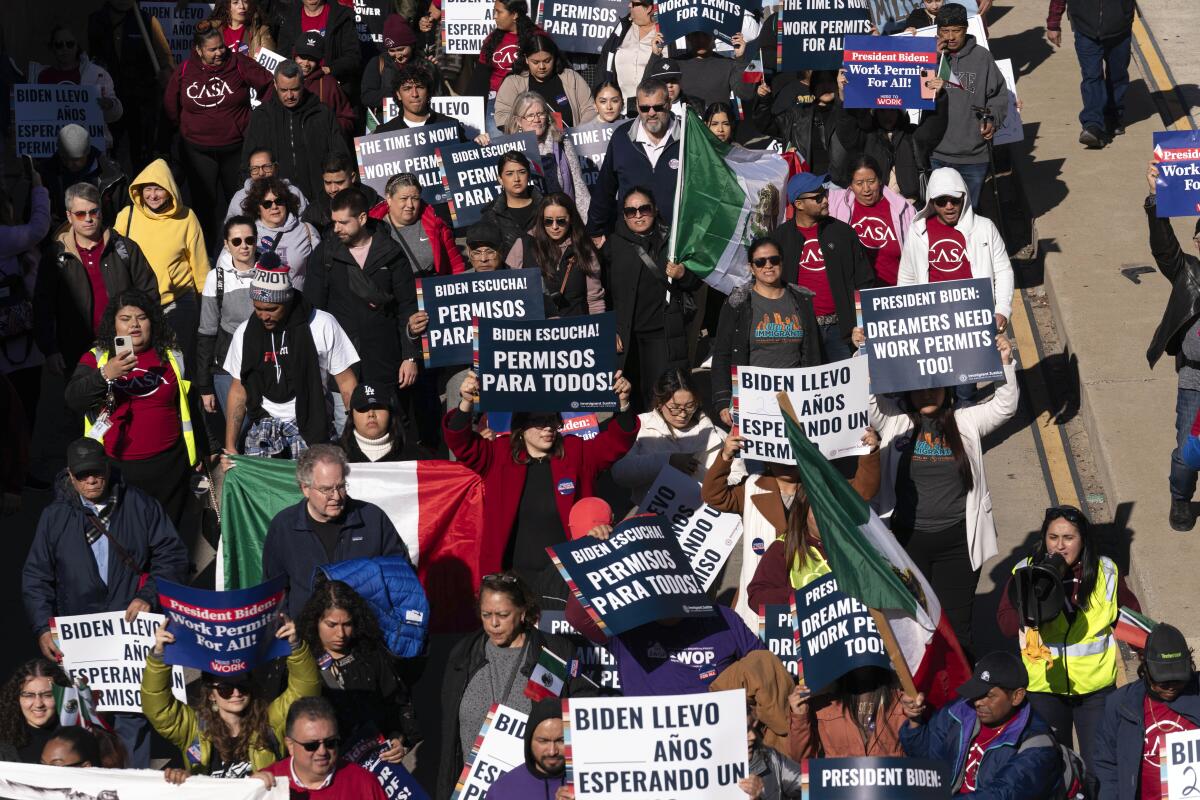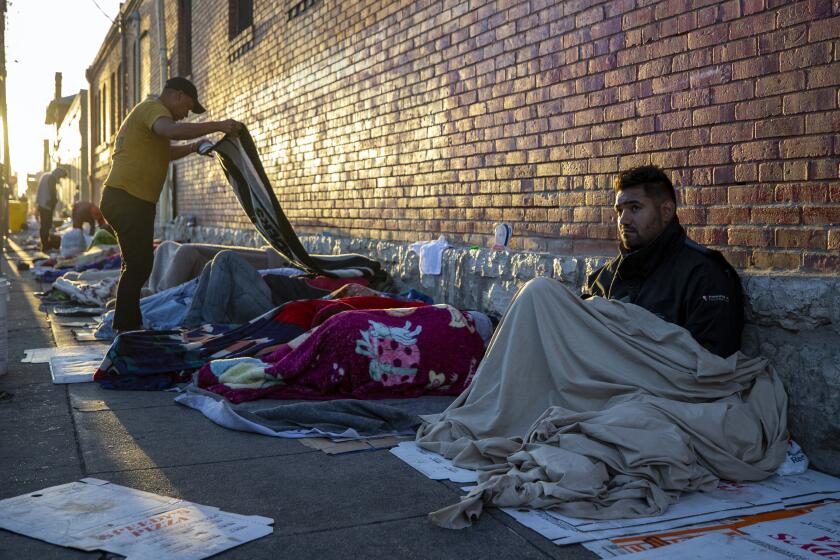Tensions simmer as new and older immigrants to U.S. strive for work permits

HOMESTEAD, Fla. — In New York, migrants at a city-run shelter grumble that relatives who settled before them refuse to offer a bed. In Chicago, a provider of mental health services to people in the country illegally pivoted to new arrivals sleeping at a police station across the street. In South Florida, some immigrants complain that people who came later get work permits that are out of reach for them.
Across the country, mayors, governors and others have been forceful advocates for newly arrived migrants seeking shelter and work permits. Their efforts and existing laws have exposed tensions among immigrants who have been in the country for years, even decades, and don’t have the same benefits, notably work permits. And some new arrivals feel established immigrants have given them cold shoulders.
Thousands of immigrants marched this month in Washington to ask that President Biden extend work authorization to longtime residents as well. Some signs read: “Work permits for all!” and “I have been waiting 34 years for a permit.”
The proposal, which recalls President Reagan’s efforts to limit asylum seekers’ movements in the late 1980s, is likely to draw fierce opposition from immigrant rights groups and border-state officials.
Despite a brief lull when new asylum restrictions took effect in May, arrests for illegal border crossings from Mexico topped 2 million for the second year in a row in the government’s budget year ending Sept. 30. Additionally, hundreds of thousands of migrants have been legally admitted to the country over the last year under new policies aimed at discouraging illegal crossings.
“The growing wave of arrivals make our immigration advocacy more challenging. Their arrival has created some tensions, some questioning,” said U.S. Rep. Jesús “Chuy” García, a Chicago Democrat whose largely Latino district includes a large immigrant population. People have been “waiting for decades for an opportunity to get a green card to legalize and have a pathway to citizenship.”
Asylum-seekers must wait six months for work authorization. Processing takes no more than a month and a half for 80% of applicants, according to U.S. Citizenship and Immigration Services.
During a campaign stop near the southern border, Florida Gov. Ron DeSantis defends his state’s decision to fly migrants to California.
Those who cross the border on the Biden administration’s new legal pathways have no required waiting period at all. Under temporary legal status known as parole, 270,000 people from Cuba, Haiti, Nicaragua and Venezuela arrived through October by applying online with a financial sponsor. Another 324,000 got appointments to enter at a land crossing with Mexico by using a mobile app called CBP One.
The administration said in September that it would work to reduce wait times for work permits to 30 days for those using the new pathways. By late September, it had blasted 1.4 million emails and texts reminding who was eligible to work.
José Guerrero, who worked in construction after arriving 27 years ago from Mexico, acknowledged many new arrivals felt compelled to flee their countries. He says he wants the same treatment.
“All these immigrants come and they give them everything so easily, and nothing to us that have been working for years and paying taxes,” said Guerrero, now a landscaper in Homestead, Fla., about 39 miles south of Miami. “They give these people everything in their hands.”
Authorities say migrants flown to Martha’s Vineyard on the orders of Florida Gov.
The White House is asking Congress for $1.4 billion for food, shelter and other services for new arrivals. The mayors of New York, Denver, Chicago, Los Angeles and Houston wrote to Biden last month to seek $5 billion, noting the influx has drained budgets and cut essential services.
The mayors also support temporary status — and work permits — for people who have been in the U.S. longer but have focused on new arrivals.
“All of the newcomers arriving in our cities are looking for the chance to work, and every day we get calls from business leaders who have unfilled jobs and want to hire these newcomers,” the mayors wrote. “We can successfully welcome and integrate these newcomers and help them pursue the American Dream if they have a chance to work.”
Many new arrivals are indisputably in dire circumstances, including some who hoped to join relatives and friends but find their calls blocked and messages unreturned.
Angel Hernandez, a Venezuelan who walked through Panama’s notorious Darién Gap rainforest, where he witnessed corpses, was sorely disappointed when he reached New York. The construction worker said he and his aunt, uncle and their two children left Colombia after more than three years because work dried up.
Migrants in Texas say contractors working for Florida Gov. Ron DeSantis pushed them to board flights to California, promising shelter and immigration aid.
Hernandez, 20, planned to settle with his uncle’s brother, who settled in the United States about a year earlier and lives in a house with a steady job. His own job search has been fruitless.
“Everyone is out for themselves,” he said outside the Roosevelt Hotel, a Midtown Manhattan property that was closed until the city opened it for migrants in May.
The influx has put many immigrant services groups in a financial bind.
For decades, the Latino Treatment Center has provided help with drug abuse to many immigrants living in Chicago without legal status. It started helping new arrivals sleeping at the police station across the street, fixing a shower in the office for migrants to use a few days a week and offering counseling.
“It is such a unique situation that we weren’t set up for,” said Adriana Trino, the group’s executive director. “This has been a whole different wheelhouse. The needs are so different.”
Gov. Gavin Newsom threatened Gov. Ron DeSantis with kidnapping charges after South American migrants were flown to Sacramento.
Many organizations deny friction and say they have been able to make ends meet.
“We’re trying to keep a balance of doing both — people who have been here for years and people who are arriving, and so far we have been able to serve everybody,” said Diego Torres of the Latin American Coalition, which assists immigrants in Charlotte, N.C.
In Atlanta, the Latin American Assn. says it has spent $50,000 this year on temporary housing and other aid for new arrivals. Santiago Marquez, the organization’s chief executive, hasn’t sensed resentment.
“Our core clients — most of them are immigrants — they understand the plight,” he said. “They’ve gone through it. They understand.”
A neighbor of a New York migrant shelter sets up a loudspeaker on his lawn that repeatedly blares, ‘Immigrants are not safe here’ in six languages.
Still, it’s easy to find immigrants with deep roots in the United States who chafe about unequal treatment.
A 45-year-old Mexican woman who came to the United States 25 years ago and has three U.S.-born children said it was unfair that new arrivals get work permits over her. She earns $150 a week picking sweet potatoes in Homestead.
“For a humanitarian reason, they are giving opportunities to those who are arriving, and what is the humanity with us?” said the woman, who asked that she be identified by her last name only, Hernandez, because she fears being deported.
The Washington rally reflected an effort by advocates to push for work permits for all, regardless of when they came.
“It is a system that has strained our city and, at this moment, it brings conflict between neighbors.” Lawrence Benito, head of the Illinois Coalition for Immigrant and Refugee Rights, said at a Chicago rally last month.
Tareen reported from Chicago. Associated Press writers R.J. Rico in Atlanta, Elliot Spagat in New York and Erik Verduzco in Charlotte, N.C., contributed to this report.
More to Read
Sign up for Essential California
The most important California stories and recommendations in your inbox every morning.
You may occasionally receive promotional content from the Los Angeles Times.
















